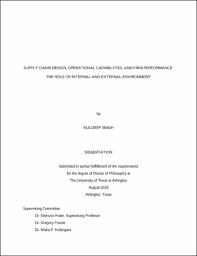| dc.description.abstract | Supply chain agility has been the cornerstone of research in supply chain management field. Despite the benefits associated with pursuing agile supply chain strategy, little is known about how the agile supply chain strategy stimulate better performance for the firms. Also, there is a lack of understanding of the conditions under which agile supply chain strategy impacts the performance. Through the theoretical lens of strategy, structure, performance paradigm, knowledge-based view, and contingency theory, this research examines the linkages from agile supply chain strategy to mass customization capability (MCC), and operational ambidexterity (OA). This study also examines the association between MCC, OA and multiple dimensions of the performance. Moreover, this research examines the role of MCC and OA as the means to achieve the objective of agile supply chain strategy. Furthermore, this study investigates the critical role played by strategic integration, environmental uncertainty, and internal integration from a contingency perspective.
The data was collected from 302 supply chain professionals working at US manufacturing firms. Structural equation modeling (SEM) was used to analyze the hypothesized relationships. The results demonstrate that agile supply chain strategy is positively associated with MCC and OA. This research shows that MCC and OA are critical capabilities that enable the company to compete on multiple dimensions of performance. Also, the results indicate that MCC partially mediates the relationship agile supply chain strategy and cost, quality, delivery, flexibility, and business performance. On the other hand, OA partially mediates the relationship between agile supply chain strategy and cost, delivery, and flexibility. Further, OA fully mediates the relationship between agile supply chain strategy and quality.
The results uncover the importance of strategic integration by demonstrating that strategic integration has a direct association with MCC in addition to moderating the relationship between agile supply chain strategy and MCC. This study also indicates that the relationship between MCC and cost, quality, flexibility, and business performance becomes stronger under the condition of high environmental uncertainty, thereby providing evidence of the effectiveness of MCC. Further, the results reveal the importance of internal integration by showing that higher the internal integration, the stronger the association between OA and cost, and flexibility. Based on the findings of this study, research and managerial implications are discussed. | |


